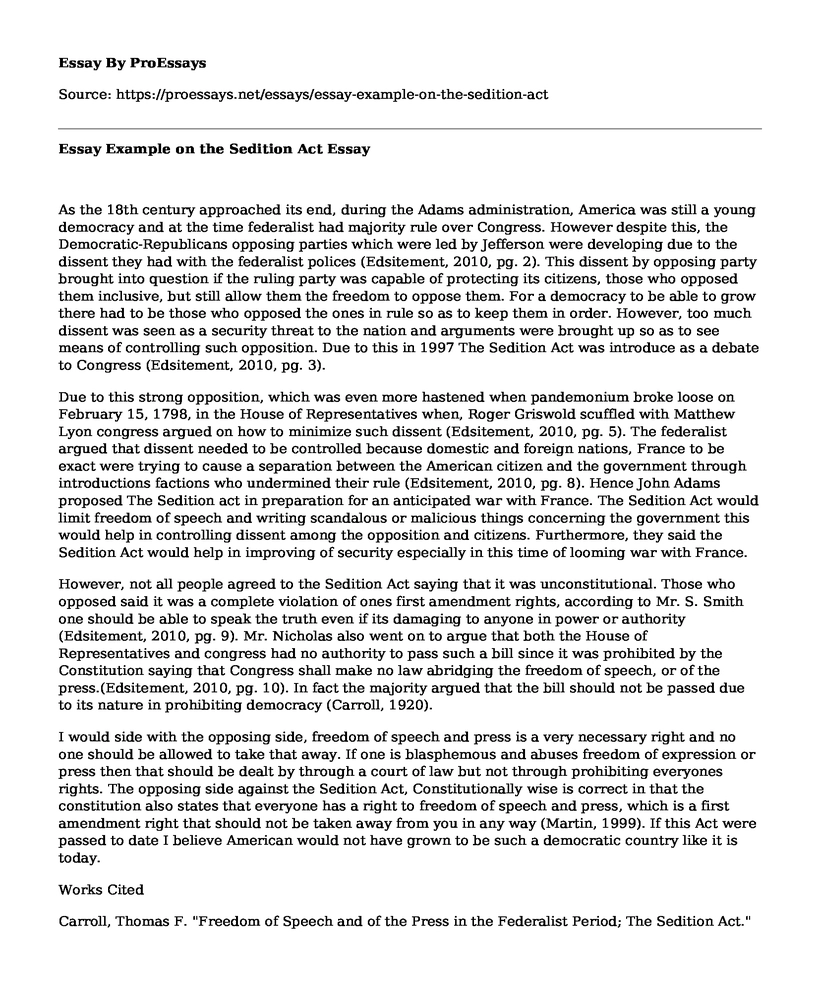As the 18th century approached its end, during the Adams administration, America was still a young democracy and at the time federalist had majority rule over Congress. However despite this, the Democratic-Republicans opposing parties which were led by Jefferson were developing due to the dissent they had with the federalist polices (Edsitement, 2010, pg. 2). This dissent by opposing party brought into question if the ruling party was capable of protecting its citizens, those who opposed them inclusive, but still allow them the freedom to oppose them. For a democracy to be able to grow there had to be those who opposed the ones in rule so as to keep them in order. However, too much dissent was seen as a security threat to the nation and arguments were brought up so as to see means of controlling such opposition. Due to this in 1997 The Sedition Act was introduce as a debate to Congress (Edsitement, 2010, pg. 3).
Due to this strong opposition, which was even more hastened when pandemonium broke loose on February 15, 1798, in the House of Representatives when, Roger Griswold scuffled with Matthew Lyon congress argued on how to minimize such dissent (Edsitement, 2010, pg. 5). The federalist argued that dissent needed to be controlled because domestic and foreign nations, France to be exact were trying to cause a separation between the American citizen and the government through introductions factions who undermined their rule (Edsitement, 2010, pg. 8). Hence John Adams proposed The Sedition act in preparation for an anticipated war with France. The Sedition Act would limit freedom of speech and writing scandalous or malicious things concerning the government this would help in controlling dissent among the opposition and citizens. Furthermore, they said the Sedition Act would help in improving of security especially in this time of looming war with France.
However, not all people agreed to the Sedition Act saying that it was unconstitutional. Those who opposed said it was a complete violation of ones first amendment rights, according to Mr. S. Smith one should be able to speak the truth even if its damaging to anyone in power or authority (Edsitement, 2010, pg. 9). Mr. Nicholas also went on to argue that both the House of Representatives and congress had no authority to pass such a bill since it was prohibited by the Constitution saying that Congress shall make no law abridging the freedom of speech, or of the press.(Edsitement, 2010, pg. 10). In fact the majority argued that the bill should not be passed due to its nature in prohibiting democracy (Carroll, 1920).
I would side with the opposing side, freedom of speech and press is a very necessary right and no one should be allowed to take that away. If one is blasphemous and abuses freedom of expression or press then that should be dealt by through a court of law but not through prohibiting everyones rights. The opposing side against the Sedition Act, Constitutionally wise is correct in that the constitution also states that everyone has a right to freedom of speech and press, which is a first amendment right that should not be taken away from you in any way (Martin, 1999). If this Act were passed to date I believe American would not have grown to be such a democratic country like it is today.
Works Cited
Carroll, Thomas F. "Freedom of Speech and of the Press in the Federalist Period; The Sedition Act." Michigan Law Review 18.7 (1920): 615-651.
Martin, James P. "When repression is democratic and constitutional: the federalist theory of Representation and the Sedition Act of 1798." The University of Chicago Law Review (1999): 117-182.
"The Sedition Act: Certain Crimes Against The United States | Edsitement". Edsitement.neh.gov. N.p., 2010. Web. 28 Feb. 2017, (Pg. 4 - 25).
Cite this page
Essay Example on the Sedition Act. (2021, Apr 09). Retrieved from https://proessays.net/essays/essay-example-on-the-sedition-act
If you are the original author of this essay and no longer wish to have it published on the ProEssays website, please click below to request its removal:
- Blacks and the Constitution Essay Example
- Citation Activity on The Rich Get Richer, and the Poor Get Robbed: Inequality in U.S. Criminal Victimization
- Essay Sample on Crime in New York Between 1850 and 1950
- The Raise of Sharecropping or Peonage - Research Paper
- Essay Sample on Passing: Exploring Racism, Belonging & Vulnerability in Harlem Renaissance
- Essay Sample on Fixed Exchange Rates: Advantages & Disadvantages
- Essay Example on School Uniforms: An Ongoing Debate in the Contemporary World







